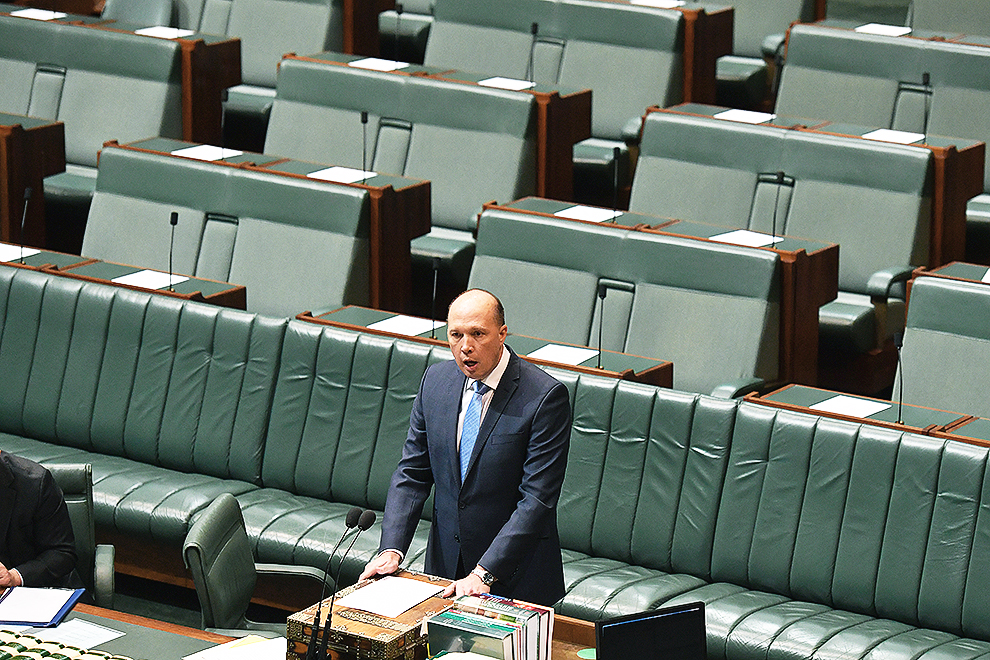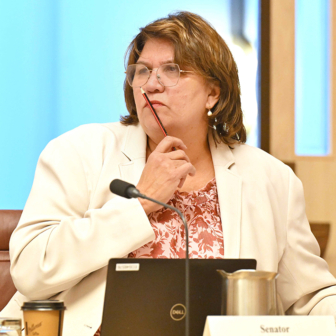Immigration minister Peter Dutton’s bill making it harder for migrants to become citizens made its controversial debut in parliament on Thursday this week. It quadruples the amount of time a migrant must live in Australia as a permanent resident before applying for citizenship. It significantly raises the bar for English-language proficiency. It introduces a new test of adherence to Australian values. And it requires migrants to demonstrate that they have made efforts to integrate into Australian society. Combined with other amendments to immigration law, these new rules would put citizenship out of reach for many migrants.
In his second reading speech to parliament, the minister described Australian citizenship as “an extraordinary privilege.” This kind of language is used so often that it usually passes unquestioned, yet it only takes a moment’s reflection to see that it doesn’t match what citizenship actually involves. To use an analogy, it equates citizenship with membership of a club. I can only join the Melbourne Club if I meet certain (written and unwritten) criteria and the existing members accept my application. If I break club rules then I can be kicked out, losing the privilege of sitting in a comfy armchair drinking cognac by the fireplace. But most Australians, including me, never applied to become citizens. We were never okayed by the existing members of Club Australia. We are citizens by birth and can’t be expelled or voted off the island.
I have never had to swear a pledge of allegiance to the nation, or sit a test to show that I understand Australian values. Nor have I had to demonstrate that I have made an effort to integrate myself into society by volunteering, looking for work or educating my children. My citizenship results from a lucky draw in the lottery of life; my character, behaviour and beliefs have no bearing. If I break society’s rules or fail to meet its obligations – by not paying tax or not voting, for instance – then I can be punished. If my transgression is serious enough, I might be locked up for the rest of my life. Yet I would remain a citizen and I would be punished as a citizen.
So citizenship isn’t really a “privilege” to be bestowed or withdrawn. It is a signifier of belonging that brings with it important rights and responsibilities. It isn’t the granting of membership but the recognition that membership has already been acquired, either through birth or through extended participation in the life of the nation.
That’s not to diminish the importance of citizenship or to suggest that it is something that gets handed out to anyone who turns up and hangs around long enough. Rather, it is to emphasise the link between citizenship and the fundamental principles of democracy.
In advance of the proposed changes to citizenship laws, the Department of Immigration and Border Protection released a discussion paper for public comment. The fact that the legislation was fully drafted and submitted to parliament just two weeks after the deadline for submissions suggests that the government had no serious interest in the responses. The paper nevertheless lays out the thinking behind the bill and can be used as a standard against which to assess it.
Democracy’s first mention comes early in the paper. The second paragraph of the introduction identifies “democracy, freedom, the rule of law and equality of opportunity – a ‘fair go’ for all” as the “Australian values” that define us as a nation. If the nebulous concept of Australian values is to be given concrete form, then an emphasis on our democratic system of government seems a reasonable starting point.
But immediately there’s a problem. If we build from this democratic base, then the introduction of far higher barriers to citizenship is contradictory. The underlying logic of a democracy is that the entire permanent adult population of the nation should participate in shaping the laws by which it is to be governed and in selecting the representatives who make those laws. As political philosopher Joseph Carens argues, “To meet the requirements of democratic legitimacy, every adult who lives in a democratic political community on an ongoing basis should be a citizen, or, at the least, should have the right to become a citizen if she chooses to do so.” The tighter citizenship tests included in the bill move in the opposite direction.
Under current law, a migrant can become a citizen after four years’ “lawful residence” in Australia, including at least one year with the status of permanent resident. If the bill before parliament passes, it will require migrants to clock up four years’ permanent residence – not just lawful residence – before applying. Peter Dutton describes this as a “probationary period, so that a person’s word and deeds across this time can be considered” before they apply for citizenship. The effect will be to substantially delay citizenship for many migrants, particularly those who initially arrive on a temporary visa.
The example of the 457 visa illustrates what this could mean in practice. In the past, an employer could sponsor a 457 visa holder for permanent residency after two years, enabling the migrant to gain citizenship after a total of four years living and working in Australia. The government’s recent changes to temporary skilled migration, however, increase the threshold for acquiring permanent residency via employer sponsorship to three years – and so, in future, a temporary migrant will generally have to live and work in Australia for at least seven years before applying to become a citizen.
Last year around 50,000 skilled migrants made the transition from a 457 visa to permanent residence, so the changes will affect large numbers of people. If seven years still seems reasonable (to me, it doesn’t), then remember that the pathway will in many cases be even longer, since temporary migrants often move across a series of visas, such as working holiday-maker visas or student visas, before attaining permanent status. In its 2016 report on Australia’s migrant intake, the Productivity Commission found that the “average duration of a multi-step pathway to permanent residency is approximately 6.4 years.”
This means that the measures in the bill would extend the transition to citizenship for these people beyond ten years. New data from the Australian Bureau of Statistics suggests that around 40,000 migrants have been living in Australia on temporary visas for about ten years; if these people are to become citizens, then their “probationary period” as residents will end up being at least fourteen years.
Since permanent residence is a precondition of citizenship, the new measures apply to people who have, by definition, already made Australia their home. In travelling along the pathway to permanent residency, they will have passed through the rigorous security, health and skills assessments needed to demonstrate their suitability to migrate to Australia. To delay full political membership of the nation by at least three more years serves no useful purpose.
Worse, it could give migrants the impression that they are outsiders who are not fully welcome, an impression reinforced by other recent changes. Under the government’s reforms to higher education, for example, permanent residents will have to pay tens of thousands of dollars more in fees to attend university because they will no longer qualify for Commonwealth-supported places (although they now have the option of deferring payment through a HECS loan).
Setting a much higher English-language hurdle is equally divisive. Requiring future citizens to have “competent” English may not sound excessive, but it would be wholly unrealistic to expect recent migrants to achieve the standard of “a competent user,” which requires an International English Language Testing System score of six. The bill does not define competent, but the explanatory memorandum says that “the minister is empowered to determine the circumstances in which a person has competent English,” which might be “where the person has sat an examination administered by a particular entity and the person achieved at least a particular score.”
For the vast majority of language learners, the 500 hours of tuition offered under Australia’s Adult Migrant English Program does not come close to achieving this level of fluency. Many adult migrants may never reach this level. Indeed, many Australian-born citizens may fall short of this standard.
While many skilled migrants will already have achieved an IELTS score of six or more to qualify for entry to Australia, the higher English-language bar will deny citizenship to many other migrants who need and want it more urgently, particularly refugees from strife-torn countries who have been resettled here under Australia’s humanitarian migration program.
Others likely to fall at the English-language hurdle are partners of Australian citizens or permanent residents, or partners of the primary applicants for skilled migration (known as secondary visa holders). Most of these partners will be women, who may not have the same level of English-language competency as their spouses, and may have caring duties at home that make it more difficult for them to acquire English-language skills quickly. To deny them citizenship because they cannot meet the required level of English serves no purpose beyond giving them the impression that they are unworthy of full admission to the Australian political community. It leaves them isolated and vulnerable in the event that there are problems in the relationship.
The new language threshold is also fundamentally undemocratic. Imagine if Australia introduced a law that prevented citizens from enrolling to vote unless they could first pass a proficiency test in English. This would be immediately recognised as unacceptable discrimination and would almost certainly be ruled unconstitutional by the High Court. Yet the proposed English-language barrier to citizenship amounts to the same thing: because only citizens are eligible to vote, it prevents settled members of the Australian nation from exercising the franchise. Whether such measures are unconstitutional would need to be tested, but they certainly fall short of the democratic ideal of universal suffrage – which is, according to the government, one of the Australian values that defines us a nation.
Nor do the heightened English-language requirements sit comfortably with the immigration minister’s claim in parliament that “pathways to citizenship give new migrants the opportunity to be full and active members and participants in Australian society.” Clearly, if the English-language barrier is set too high, then it has completely the opposite effect, because the pathway to full membership and active participation is closed off.
Since the Nationality and Citizenship Act 1948 came into force, Peter Dutton told parliament, “more than five million people have chosen to become Australian citizens.” Yet if his proposed English-language requirements for citizenship had applied in the past, then vast numbers of those postwar migrants and refugees would have been denied citizenship. The prime minister celebrates Australia’s record as “the most successful multicultural nation in the world.” Even if this is an exaggeration, it is hard to imagine that Australia’s multicultural record and history of social cohesion would be as good as it is if millions of postwar migrants had been denied citizenship because they did not speak university-level English.
Inevitably, security, safety and counterterrorism are dominant themes in the government’s discussion paper. In parliament, the minister put the bill in the context of “an increasingly challenging national security environment and complex global security situation.” Making Australia safe is an entirely valid aim, but it seems to have little connection to the issue of citizenship. If recent migrants pose a security threat to Australia, they do so regardless of whether they obtain the status of citizen, since they are already resident in Australia. Delaying or denying a pathway to citizenship for migrants can’t appreciably improve national security or in any way reduce terrorism. It may, however, have the opposite effect if it leads some migrants to feel that they are excluded, marginalised and unwanted.
Other technical measures in the proposed legislation have largely escaped attention. Under existing laws, any child born and raised in Australia until the age of ten automatically becomes a citizen, regardless of the parents’ migration status. Children of undocumented migrants, for example, or children of asylum seekers living on a succession of temporary protection visas become citizens in their own right on their tenth birthday. Peter Dutton asked parliament to change the law so that the automatic acquisition of citizenship at age ten only applies “to those persons who have maintained lawful residence in Australia throughout the ten years, including maintaining a right to return if they travel outside Australia during those years.” Since refugees on temporary protection visas and safe haven visas lose the right to return to Australia if they travel overseas, their Australian-born children will no longer have a pathway to citizenship.
The bill also renames the “pledge of commitment” required for citizenship as the “pledge of allegiance,” and allows the minister to delay inviting an applicant to make the pledge for up to two years. The minister says this is necessary to “better align with time frames of some complex investigations” into the background of applicants. It could also be seen as a way of circumventing December’s Federal Court finding that the minister was wrong to withhold invitations to citizenship ceremonies from Afghan refugees.
Citizenship is important and should not be taken lightly, but most of the measures in the government’s bill are at best unnecessary and at worst counterproductive. Rather than promoting increased social cohesion, increased loyalty to the Australian nation and greater adherence to Australian values, they are likely to intensify marginalisation, alienation, resentment and division. The bill fosters not unity but disunity. It promotes neither cohesion nor a sense of belonging, instead creating division and a sense of exclusion.
“People who live and work and raise their families in a society become members, whatever their legal status,” writes Joseph Carens in The Ethics of Immigration. They acquire “a moral right to citizenship from their social membership and the fact of their ongoing subjection to the laws.” •




